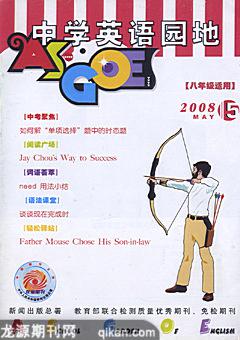新目标英语八年级(下)疑难解析(Units 7~8)
王对成
1. Would you mind turning down the music? (P52) 把音乐关小一点行吗?
“Would you mind doing ...?”意为“你……好吗?”或“……你介意吗?”,相当于“Will you please do ...?”句式。再如:
Would you mind waiting a few minutes? 等几分钟好吗?
Would you mind closing the window? 把窗户关上好吗?
2. If you finish these tasks,we can go to a movie tonight. (P54) 如果你完成这些任务,我们今晚就能去看电影。
句中的if意为“如果”,引导的是条件状语从句。除了if之外,unless也能引导条件状语从句。 unless意为“除非”,在意义上相当于“if ... not”。 如果主句中使用一般将来时,在时间和条件状语从句中常用一般现在时来表示将来时间。例如:
You will fail unless you study hard. (= You will fail if you dont study hard.) 除非你努力学习,否则你考试会不及格的。
If you eat too much,you may get fat. 如果你吃得太多,你就会发胖。
He will go to the Great Wall if it doesnt rain tomorrow. 如果明天不下雨的话,他就去长城。
3. I dont like waiting in line when a shop assistant has a long telephone conversation. (P56) 售货员打起电话来没完没了,我不愿排队等候。
wait in line的意思是“排队等候”。例如:
We should wait in line to get on the train. 我们应该排队等候上火车。
Theyre waiting in line to buy tickets for the new movie. 他们在排队等候买票看新影片。
4. I dont like it when shop assistants follow me around. (P56) 我不喜欢售货员跟在我的旁边。
1) 句中的“it”用作形式宾语,真正的宾语是when shop assistants follow me around。 再如:
I hate it when the weather is very hot. 我不喜欢大热天。
2) follow sb around的意思是“跟在某人旁边”。例如:
What annoys people a lot is when people go into the supermarket the salespersons always follow them around. 使人们非常烦恼的是,进入超市时,售货员老是跟在身边。
5. I get annoyed when someone talks to me while Im reading. (P56) 我看书的时候,有人和我说话,我会很气恼。
句中的get annoyed表示“气恼”之意。例如:
Linda always gets annoyed when someone calls her nick name. 当有人叫她的绰号时,琳达总是很生气。
I got annoyed when I saw him late again last class. 看见他上节课又迟到时,我很气恼。
annoy常指由于干扰、不顺利或受不了某种外界的干扰而“烦恼,懊恼”。例如:
I was annoyed by his bad manners. 他的无礼使我恼怒。
I get annoyed when my classmates borrow my eraser and dont return it. 当同学借我的橡皮不还时,我会很生气。
6. For example,standing very close to the person you are talking with is quite common in some Asian countries. (P58) 比如,在亚洲的一些国家,和你说话的人站得很近是很平常的一件事情。
这个句子的结构比较复杂。 standing very close to the person you are talking with是动名词短语作主语,其中,you are talking with是定语从句,修饰the person。 注意:动名词在句中作主语时,谓语动词应为单数形式。例如:
Working with them is a very pleasant thing. 和他们一起工作是一件非常愉快的事情。
Forgetting the past means betrayal. 忘记过去就意味着背叛。
7. Even if you are with your friends,it is better to keep your voice down in public places. (P58) 即使你与朋友在一起,在公共场合也不要大声喧哗。
1) even if引导的是一个让步状语从句。可以引导让步状语从句的还有though/although(虽然),even though(尽管),whoever/no matter who(无论谁),however/no matter how(无论怎样),whatever/no matter what(无论什么)等。例如:
Though its hard work,I enjoy it. 尽管这项工作很辛苦,但我还是喜欢它。
No matter how hard the work was,he never gave it up. 不管工作有多么艰难,他从不放弃。
He wouldnt stop watching TV,even if he was going to have an important exam the next day. 即使第二天有个重要的考试,他还在看电视。
2) “Its + 名词或形容词 + 动词不定式”这种句式很常见。其中“it”是形式主语,后面的动词不定式是真正的主语。例如:
Its our duty to keep our environment clean and tidy. 保持环境清洁是我们大家的责任。
Its impolite to talk loudly in public. 在公共场合,大声说话是不礼貌的。
8. In fact,we should also take care not to cough or sneeze loudly in public if possible. (P58) 事实上,我们应该注意尽可能不要在公共场合大声咳嗽或打喷嚏。
1) not to cough or sneeze loudly是动词不定式的否定形式,在句中作状语。例如:
He ran so fast as not to miss the first bus.他跑得飞快以便不耽误坐第一班车。
We live not to eat,but eat to live. 我们活着不是为了吃饭,但吃饭是为了活着。
2) if possible是if it is possible的省略形式。例如:
Well go there with them if possible. 如有可能,我们会和他们一起去那儿。
9. People dont usually like to be criticized,so we have to be careful how we do this. (P58) 人们通常不喜欢有人批评自己,所以我们必须小心对待做这件事的方式方法。
to be criticized是动词不定式的被动式,它表示动词不定式的逻辑主语是不定式动作的承受者(对象)。例如:
I hope to be invited to the party. 我希望有人邀请我去参加晚会。
He doesnt like to be praised in publice. 他不喜欢当众受表扬。
10. If you see someone you know doing this,you can ask them,“Would you mind picking it up?” (P58) 如果你看见你认识的人在那样做,你就可以向他们发问,“把它捡起来行吗?”
句中的you know是定语从句,修饰先行词someone。 doing this是现在分词短语,作宾语补足语。注意:在see,watch,hear,listen to,look at,feel等感官动词后面,应用省去“to”的动词不定式作宾语补足语,来表示动作的全过程;用现在分词作宾语补足语,来表示动作正在进行。例如:
I hear someone knocking at the door. Please go and see who it is. 我听见有人在敲门,请去看看是谁。
We saw him enter the building and go upstairs. 我们看到他走进大楼并上楼了。
11. Now shes too big to sleep in the house,so I made her a special pig house. (P64) 现在她长大了,房子里睡不下她了,所以我给她做了个特殊的猪房。
“too + 形容词或副词 + to + 动词原形”表示“太……以至于不能……”。其中“to + 动词原形”构成动词不定式。例如:
He is too tired to go any further. 他太累了,不能再往前走了。
She is too shy to speak to him. 她太害羞,不敢同他讲话。
He is too young to tell right from wrong. 他太小,还分不清是与非。
注意:在“too ... to ...”结构中,to前面可以用“介词for + 名词/代词”来引出该动词不定式的逻辑主语。例如:
The box is too heavy for me to carry. 这个箱子太重,我拎不起来。
12. Sometimes I dont have enough time to spend with her. (P64) 有时候我没有足够的时间与她呆在一起。
enough用作形容词时,意为“足够的”或“充分的”,多用作定语,可位于被修饰的词前面,也可位于被修饰的词后面。 enough用作副词,修饰副词或形容词时,一般位于被修饰的词后面。例如:
The question was how he could earn enough money to support himself. 问题在于他怎样才能挣到足够的钱来养活自己。
We dont have enough time/time enough to finish the work. 我们没有充足的时间来完成这项工作任务。
The boy is old enough to go to school. 这孩子到了上学的年龄了。
13. Later,the same gift may be given away to someone else. (P65) 后来,这个小礼物可能被转送给别人了。
1) 本句中的谓语是由“情态动词 + be + 动词的过去分词”构成的,表示一个被动动作。再如:
Many trees should be planted on the mountains. 山上应该多种树。
When must this work be done? 这项工作必须在什么时候做完?
This work neednt be done at once. 这项工作没必要马上去做。
This problem cant be worked out very easily. 这道题不是轻而易举能解出来的。
2) else用作形容词时,能修饰someone,somebody,something,anyone,anybody,anything,everyone,everybody,everything,nobody,no one,nothing,much,little,few等不定代词或what,who等疑问代词以及somewhere,anywhere等副词,但不能用来修饰名词。例如:
Do you have anything else to say? 你还有什么要说的吗?
What else would you like? 你还要别的什么东西吗?
14. She also said that singing English songs made her more interested in learning English. (P65) 她还说,唱英语歌曲使她对学习英语更感兴趣了。
本句结构较为复杂。在that引导的宾语从句中,singing English songs是动名词短语作主语,more interested in learning English是宾语补足语。注意: “make + sb/sth + adj(宾语补足语)”意为“使某人或某物处于某种状态”。例如:
Taking more exercise will make you healthy. 多运动会使你身体健康。
The news made him happy. 这个消息使他很高兴。

